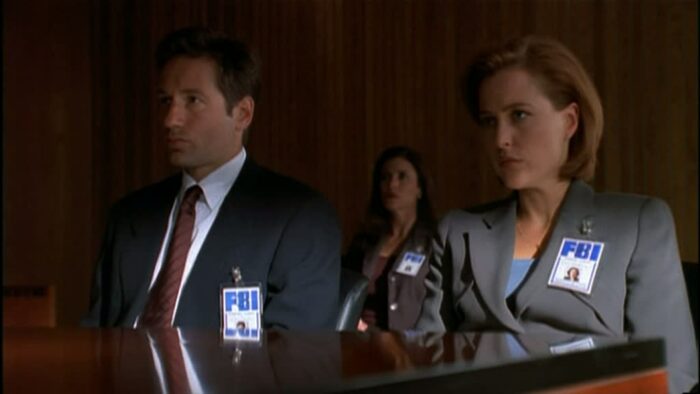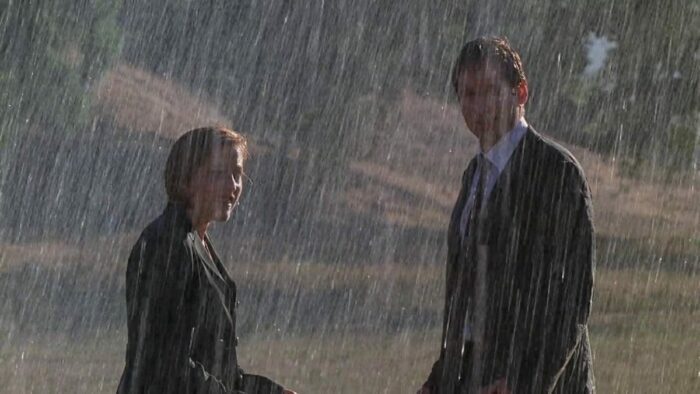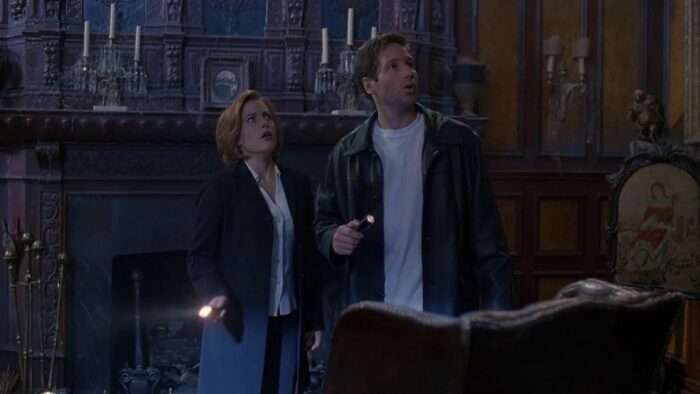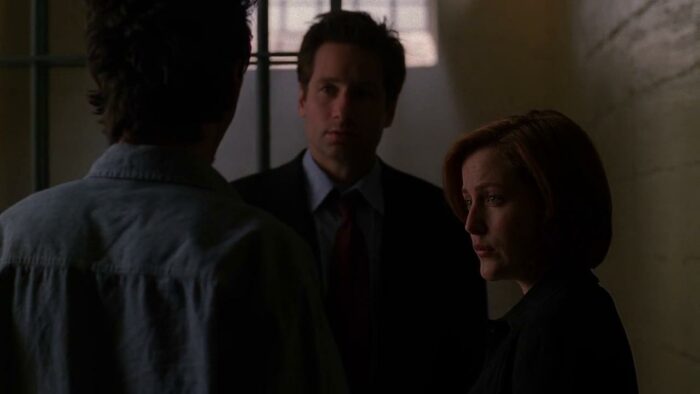As with most fandoms, The X-Files contains multitudes, not just in terms of storytelling but of audiences.
The series practically cultivated the term ‘shipper’ at the turn of the 1990s, as ‘X-Philes’ very swiftly in significant numbers began to root for the platonic professional friendship of intrepid FBI agents Fox Mulder and Dana Scully to blossom into romantic attachment, a development creator Chris Carter and his writing staff avoided up to the penultimate season explicitly. Equally, on the flip side, a ‘No-Romo’ contingent exists, who reject the advancement of the so-called ‘MSR’ (Mulder Scully Relationship) and prefer to think of the agents as friends and nothing more. Then you have people like me, square in the middle, who don’t watch the series for the relationship at all but who have no issue whichever way it goes.
On a technical basis, the Shippers win the argument. The X-Files gave in to the base instincts of long-running television to partner and couple, to give way to the undeniable chemistry between lead actors David Duchovny and Gillian Anderson, and remove the ‘UST’ (Unresolved Sexual Tension) from the series’ framework. In truth, by the time The X-Files ventured down this road, the thirst was largely sated. Duchovny had left as a full time player, two new lead characters had been devised to replace the dynamic initial duo for the last season (before the 2016 revival seasons), and Scully had been reduced to a maternal third wheel. Their romantic attachment mattered less. The point it did matter is a season that, on one level, defies traditional analysis in the context of the series.
Season 6 was the first year of the show not filmed in Canada’s chilly Vancouver as the show re-located to the warmer, sunnier locale of Los Angeles, closer to Hollywood and home for Duchovny, and with that move came a change in tone. Gone was the Canadian-shot propensity in the first five seasons for intemperate chillers, horror stories and black comedies, and with Los Angeles came a warmer, parodic tone that only semi-regularly across the sixth and seventh seasons gave way to the ambitious darkness on which The X-Files had constructed its zeitgeist-baiting sense of paranoia and dread.

Darren Mooney encapsulated the feeling entering this season:
It was clear that The X-Files had accomplished everything that it could ever want by the start of the sixth season. Chris Carter had his five seasons and a movie. Fox had a show they could syndicate. David Duchovny had forced the production to move to Los Angeles so that he could spend time with his family. Although nobody knew it at the time, the fifth season secured the highest rankings that a season of The X-Files would enjoy in the Nielsen Ratings. So going into the sixth season of The X-Files, there was only one question hanging in the air. What now?
The answer was, it seems, to give the fans, or at least the vocal Shipper contingent of the fans, what they wanted.
Season 6 arrived in the wake of feature film Fight the Future in 1998, best remembered in some quarters less for the myriad mythological rumblings of the alien conspiracy plotline it indulged, but rather Mulder & Scully’s near miss kiss after an emotional confrontation, scuppered by (of all things) an alien virus-carrying bee. ‘Triangle’, the third episode of Season 6, sees Carter adapt the conventions of Alfred Hitchcock’s Rope for a meta, narrative bending take on the legendary Bermuda Triangle, but again the episode is remembered well for a denouement in which Mulder remembers a passionate kiss he shared with either a 1939-era double of Scully on a ghost ship lost in time or a figment of his overactive dream state. “I love you” he tells Scully. “Oh, brother!” is her eye rolling response. Yet in this moment, true or not, Mulder says three words, very clearly, that many in the fandom had long wanted to hear.
‘Triangle’ marks the beginning of a seasonal obsession with the ‘MSR’ that undergirds the majority of the year, even when it never builds explicitly anywhere in particular. The series becomes fascinated with exploring various aspects of the relationship as it begins, almost by osmosis, to evolve from a platonic, deep friendship into a deeper, quasi-sexual connection. The two-part episode ‘Dreamland’, in which a chance UFO encounter outside the infamous Area 51 sees Mulder body swap with Michael McKean’s slippery, morally dubious family man (and Man in Black) Morris Fletcher, and he immediately falls under the whip of Morris’ viperish, long neglected suburban housewife Joanne, while Scully is charmed (or rather inappropriately groped) by Fletcher enjoying life as the handsome FBI agent who should be far more successful with women than he actually is.
This begins what, in retrospect, is a significant level of biased writing from the all-male ’90s writing team of Mulder in relation to Scully when it comes to both their relationship, and theirs in relation to other people. Mulder as Fletcher shows Joanne a kindness and care which, come the end, provides Morris with a second chance at his entire marriage (one you sense he only half-heartedly takes when he reappears in ‘Three of a Kind’ for a brief cameo trying to get in a sozzled Scully’s pants), but Scully gets little from these interactions than the comedy, for our benefit, of Fletcher’s amorous intentions. Much like Season 4’s ‘Small Potatoes’, when shapeshifting rapist Eddie van Blundht pretends to be Mulder and almost sleeps with her, we are meant to enjoy Scully falling for (fake) Mulder’s charms as part of the MSR sensibility being indulged, rather than be disturbed at how she is being taken advantage of by a trickster.

The season becomes increasingly obsessed with amore and quite how Mulder and Scully fit in a romantic paradigm. ‘The Rain King’ seems expressly designed for Shippers in an almost calculated way. Easily the closest The X-Files ever comes to pure romantic comedy, and as ‘lite’ as the show gets, it is geared around a small Kansas town, a high school reunion, lovesick weatherman Holman Hart controlling the weather unknowingly in response to his bottled up feelings, and sees Mulder desperately working to help him express himself to quash the advances of Sheila, the woman Holman desires. It has a deliberately twee happy ending, the kind Mulder & Scully will never get, with a picket fence, a rainbow and homely music. There is a feel that the show is almost mocking the Shipper base on one level while appealing directly to them on another.
Perhaps the best example in the first half of Season 6 of how the MSR is examined lies in ‘How the Ghosts Stole Christmas’, a joyous festive episode which sees Mulder and Scully, on Christmas Eve, become trapped in an abandoned old house at the mercy of two ghosts, Maurice and Lyda (special guest stars Ed Asner & Lily Tomlin), who died a century earlier in a lovers pact and work to psychoanalyse both agents in relation to the feelings, ultimately, one has for the other.
“Two such lonely souls,” Lyda suggests of our heroes, as Chris Carter’s script twists the fantasy of the narrative into exploring the platonic bond through an assumed, developing romantic attachment, and there is a continued sense—building on the last ‘gimmick’ episode ‘Triangle’—that the series is inexorably steamrollering toward their inevitable coupling. “Maybe I did want to be out there with you,” Scully admits by the end, even though she spends the majority of the episode desperate to escape Mulder’s night before Christmas spook hunt.
What becomes clear as the series moves from the light-hearted first half of the season—broken in two by the mythology-shattering two-part mid-season episodes ‘Two Fathers’ and ‘One Son’—is Scully’s increased sense of obsessiveness and jealousy as the friendship races toward relationship. Season 5 finale ‘The End’ introduced Diana Fowley, an old ‘chickadee’ (as described by Frohike of the Lone Gunmen) of Mulder’s who helped him form the modern X-Files department before the series began, and she very immediately is characterised as an ‘other woman’ designed to enrage the Shipper sub-fandom and drive a wedge between the developing MSR dynamic, given the undercurrent of attraction and latent feelings between Mulder and Diana, which is never made explicit but is very clearly drawn. Diana is the ne plus ultra of the threatening sexual candidate for Mulder’s affections who has appeared in different guises across the series—Phoebe Green in ‘Fire’; Dr. Bambi Berenbaum in ‘War of the Coprophages’; Detective White in ‘Syzygy’.

It would be unfair to say Diana brings out the worst in Scully when, in fact, she brings out the worst in how Scully is written more appropriately. In ‘One Son’, when Diana has the agents put in CDC quarantine after they encounter what she claims is a bio-weapon, Scully refuses to trust her. “Mulder, this stinks, and not just because I think that woman is a…well, I think you know what I think that woman is.” She finds it almost impossible to hide the latent enmity toward any woman who threatens her position as the most important female figure in Mulder’s life.
This is ever more apparent in the season’s nadir, ‘Alpha’, where Scully’s animosity toward dog expert Karin Berquist leads her to utter the line “She’s enamoured of you, Mulder. Don’t underestimate a woman. They can be tricksters, too.” Scully’s strength as a feminine icon, a medical doctor, a pioneer of science and a strong foil to Mulder’s privileged masculine charm is undercut entirely in scenes where she is depicted as an envious, slightly embittered schoolgirl who dislikes any woman sharing space with ‘her man’. These are the low points of the MSR.
Season 6’s exploration of the dynamic is, nevertheless, perhaps at its best in some of the later episodes of the season. ‘Monday’—itself a tremendously well-executed take on the time loop narrative trope—explores the prosaic nature of Mulder and Scully’s lives at the FBI and, while not expressly about any kind of attachment or dynamic between them, it implies an awareness of the day to day interaction between them that feels less like co-workers and more akin to two people cohabiting. ‘Arcadia’ takes this one step further by having the agents go undercover in an idyllic gated community as a married couple to investigate a murder, and is the most expressly deliberate way of depicting the MSR in its most primal, obvious form; Mulder enjoys the role, intentionally boorish and playful, while Scully reluctantly plays along, somewhat exasperated by how Mulder plays house. “You know, you fit in really well here,” Mulder suggests of Scully about the clean, provincial suburban life. “And you…don’t” Scully replies, wearily.
Yet the joke works in ‘Arcadia’ and plays their advancing attachment enough for comic effect to make sense. It’s no accident Mulder decides their undercover names are Rob and Laura Petrie, in a nod to the domestic comedic ‘bliss’ of The Dick Van Dyke Show. By ‘The Unnatural’, late in Season 6, they are effectively on a first date scenario as Mulder teaches her how to shuck a baseball, but the most fascinating study of Scully from a perspective of desire lies in ‘Milagro’—one of the strangest episodes of the entire series—which sees Scully become the object of obsession for Philip Padgett, a writer who lives next door to Mulder, and who both objectifies and entrances Scully by tapping into the side of her nature attracted to intense men sparked by a touch of arrogant genius, or a sense of interior detachment.
It veers close to ‘Never Again’ in Season 4, as a cancer-ridden Scully engages in a self-destructive flirtation with handsome Ed Jerse, who also happens to be sporting a murderous tattoo encouraging him to kill (voiced by Jodie Foster, no less), before almost ending up dead. Padgett is cut from the same cloth but Carter’s male gaze of Scully is different in ‘Milagro’, framed as it is in the context of Mulder’s confident belief she would hold no interest in Padgett’s twisted affections. In truth, Scully is fascinated by the man, perhaps a little attracted, and his arresting depictions of her cut deep. “He cornered me today and told me my life story. It was kind of frightening, actually. ‘Frightening’ as in too much information and intimate detail.” Whether Scully’s complicated enjoyment and repulsion of the attention Padgett gives her is further evidence of problematic male writing, especially from a removed distance of two decades, is left for the audience to decide.

Intimacy is not something that comes easily to either Mulder or Scully, and while they eventually reach a point of union in later seasons, as offspring complicate their dynamic, Season 6 remains the most intriguing collection of stories in The X-Files in regard to their advancing relationship. A remarkable amount of the season, when deconstructed and boiled down, concerns different aspects of the MSR and what such a relationship means, and would mean, in different contexts. Both display jealous behaviour. Both confront and yet shield feelings from one another. Both struggle to truly convey to one another what they really want to express. And while the season as a whole relies too heavily on comedy and gimmickry, never truly managing to encapsulate the series at its disturbing, paranoid best, and at points saddling Scully with unsympathetic characterisation, it manages to capture something about Mulder and Scully as more than friends in a way no other season achieves. It begins to normalise it. Which changes The X-Files, for good or bad, forever.
The defining image perhaps lies in the penultimate episode of the season, the strange and trippy ‘Field Trip’, where the agents become trapped underground by plant life and hallucinate various scenarios jointly, before being found, just before their bodies would be broken down into acidic form. Covered in burns, they are driven away in an ambulance on separate gurneys and reach out, hands touching, barely having survived. That’s Mulder and Scully’s relationship, romantic or not. That’s the intimacy. That is the show the Shippers, No-Romo’s and everyone in-between, can collectively get behind.


Wow this is an amazing analysis. I recently rewatched Field Trip, and the ending with them holding hands just speaks to me more about their relationship than the Millennium kiss for eg. At the beginning of the episode Mulder actually snaps at Scully in a very arrogant way, about how he is usually right and she could start agreeing with him more. I hated that he talked to her like that because it diminishes her role in any discovery they have done, like she is just there for the ride following him while he does all the work. But later throughout the episode I think they both realize that what works for them is that they question each other, and it works for them to the point it has saved each others lives countless times and that’s why I think Mulder reaches his hand to her at the end, acknowledging that they are a team and their constant questioning of each other is fundamental to the success of their relationship and partnership.